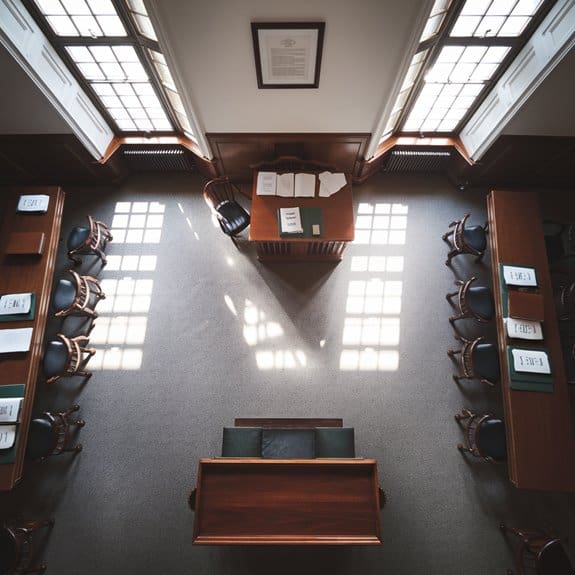
In BC estate litigation, hearsay evidence (out-of-court statements) is generally inadmissible, but important exceptions exist. Under WESA, written statements from the deceased about their intentions may be permitted, while the “principled approach” allows hearsay when necessity (declarant unavailable) and reliability are demonstrated. Courts evaluate these statements based on timing, consistency with other evidence, and the absence of motives to lie. Understanding these nuances can greatly strengthen your estate case.
Understanding the General Rule Against Hearsay in Estate Cases
When dealing with estate litigation in British Columbia, you will encounter a fundamental legal principle: hearsay evidence is generally inadmissible in court. This means that statements made by individuals outside the courtroom, whether oral or written, cannot typically be presented as evidence to prove the truth of what they assert.
This rule presents unique challenges in estate cases where key evidence often involves statements from the deceased person. For example, what the deceased told family members about their intentions for asset distribution may be vital to your case but technically constitutes hearsay.
The rationale behind this restriction is sound: statements made outside court have not been subject to cross-examination, sworn testimony, or judicial observation—all essential elements for evaluating reliability and truthfulness.
This safeguard helps maintain the integrity of court proceedings in estate matters.
Key Exceptions to the Hearsay Rule That Apply to Wills and Estates
Despite the general prohibition against hearsay, several important exceptions allow such evidence in estate litigation cases. These exceptions are particularly relevant when dealing with a deceased’s intentions or state of mind.
While hearsay is generally inadmissible, key exceptions exist for estate litigation, particularly when probing a deceased person’s intentions.
The “principled approach” established by Supreme Court cases permits hearsay evidence when necessity and reliability can be demonstrated. In estate matters, necessity is typically established because the declarant is deceased. Reliability is assessed based on factors including the timing of statements, absence of motive to lie, and corroborative evidence.
Additional exceptions include statements indicating mental or emotional conditions and declarations of intention.
The Wills, Estates and Succession Act (WESA) specifically relaxes evidentiary rules in will variation claims, allowing courts to reflect on statements about a will-maker’s reasons for their testamentary dispositions, whether written or oral.
The “Principled Approach”: Necessity and Reliability Standards
The “principled approach” to hearsay evidence represents a significant evolution in Canadian evidence law, offering flexibility where traditional hearsay rules might prevent essential testimony in estate litigation.
When you are handling an estate dispute involving statements from the deceased, courts will evaluate admissibility based on two key criteria:
- Necessity – Readily established when the declarant is deceased and their evidence is relevant to the issues
- Reliability – Focuses on circumstances surrounding when the statement was made
- Threshold reliability – Requires specific indicators as established in R. v. Khelawon
- Corroboration – Independent evidence that supports the trustworthiness of the statement
This approach allows courts to assess vital evidence while maintaining safeguards against unreliable testimony, which is particularly important when determining a testator’s true intentions.
WESA Section 62: Special Rules for Hearsay in Wills Variation Claims
British Columbia’s Wills, Estates and Succession Act (WESA) establishes special provisions for hearsay evidence in wills variation claims through Section 62, which greatly relaxes the traditional rules of evidence. The court may consider evidence of the will-maker’s reasons for making specific gifts or excluding certain beneficiaries.
| Evidence Type | Admissibility | Weight Considerations |
|---|---|---|
| Written statements signed by testator | Explicitly permitted | High probative value |
| Oral statements to witnesses | Potentially admissible | Court assesses reliability |
| Circumstantial evidence | Generally admissible | Evaluated with other evidence |
| Third-party hearsay | Limited admissibility | Lower weight unless corroborated |
You will find this approach differs greatly from standard hearsay rules, as WESA recognizes the unique challenges in determining a deceased person’s intentions. Courts maintain discretion regarding the weight given to such evidence based on reliability factors.
Evaluating the Weight and Credibility of Hearsay Statements
When hearsay statements are admitted into evidence during estate litigation proceedings, judges must carefully evaluate their weight and credibility using established legal principles.
The court does not automatically give hearsay the same weight as direct testimony but instead applies specific factors to determine its reliability.
- Timing of the statement in relation to the events it describes (contemporaneous statements often carry more weight)
- Presence or absence of motives to lie by the declarant
- Consistency with other independent evidence in the case
- Mental capacity and understanding of the declarant when the statement was made
You will find that courts examine the circumstances surrounding the statement carefully, including the solemnity of the occasion and whether the statement was made in a context emphasizing truthfulness.
Landmark BC Cases That Shaped Hearsay Admissibility in Estate Litigation
Several landmark British Columbia cases have fundamentally shaped how hearsay evidence is handled in estate litigation, building upon the principles discussed for evaluating weight and credibility.
In Holst v. Holst, the court established that all circumstances surrounding a statement must be considered, including timing, demeanour, and absence of reasons for fabrication.
Bellinger v. Nuytten Estate reinforced that the necessity requirement is typically met when the declarant is deceased, while reliability depends on the court’s assessment of ultimate reliability and weight.
Additionally, Stephens v. Austin acknowledged that while hearsay from interested parties raises reliability concerns, these can be addressed when determining the statement’s evidentiary weight rather than its admissibility.
Documenting the Deceased’s Intentions: Beyond Written Statements
Although written statements signed by the testator provide the most direct evidence of intentions, BC law recognizes that a deceased’s wishes can be documented and presented in court through various other means.
Section 62 of WESA establishes that courts may consider all relevant circumstances when determining the weight of evidence about a will-maker’s intentions.
Beyond formal written statements, courts may admit:
- Oral statements made by the deceased to friends, family, or professionals
- Electronic communications like emails or text messages discussing estate plans
- Notes or informal documents expressing wishes but lacking formal execution
- Witness testimony about the deceased’s consistent expressions of intent
The McLean v. Leffler case confirmed that “written statement signed by the testator” is not the exclusive method to prove intentions, opening the door for various forms of evidence to establish a deceased’s true wishes.
How Vest Estate Law Can Help
Maneuvering the complex terrain of hearsay evidence in estate matters requires specialized legal expertise. At Vest Estate Law, our team focuses exclusively on wills and estates law across Alberta and BC, giving us the depth of knowledge needed to navigate these evidentiary challenges effectively.
When you are dealing with statements from a deceased loved one that could impact estate distribution, we can help determine if such evidence meets the necessity and reliability thresholds for admissibility. Our expertise in the “principled approach” to hearsay guarantees we can properly frame and present essential testimonial evidence.
As a boutique firm dedicated solely to estate matters, we appreciate the nuances of WESA provisions and relevant case law that allow for relaxed evidentiary standards in certain circumstances, maximizing your chances for a favourable outcome.
Frequently Asked Questions
Can Text Messages From the Deceased Be Admitted as Evidence?
Yes, your deceased loved one’s text messages can be admitted as evidence under the principled approach if they are necessary and reliable, especially when showing their intentions or state of mind.
How Long After a Statement Is Made Can It Remain Reliable?
There is no fixed time limit for a statement’s reliability. Courts assess each case individually, considering factors like the declarant’s mental capacity, corroborating evidence, and circumstances when the statement was made.
Can Video Recordings of the Testator Explaining Intentions Bypass Hearsay Rules?
Video recordings of a testator can bypass hearsay rules if they meet the reliability requirements by providing contemporaneous, uncoerced statements that clearly demonstrate your intentions without external influence.
Does Opposing Counsel Have the Right to Exclude All Hearsay Evidence?
No, opposing counsel cannot exclude all hearsay evidence. They can object, but courts may admit it through exceptions or the principled approach based on necessity and reliability.
Can Statements Made by the Deceased to Medical Professionals Be Admitted?
Statements made by the deceased to medical professionals can often be admitted as hearsay exceptions when they are relevant to the deceased’s state of mind, physical condition, or treatment-related circumstances.

We serve the entire province of BC. Our experienced paralegals can meet with you in Vancouver and throughout the Lower Mainland, making it easier for you to get the assistance that you need. We also have an interior office in Kamloops. That said, our lawyers have the infrastructure to work with any of our clients virtually — even in the furthest regions of British Columbia.
Call (604) 256-7152 [toll free 1 (877) 415-1484] to get routed to the best representative to serve you or contact us online to schedule an appointment.
We also have a dedicated intake form to help you get the ball rolling. Our intake team will review your specific case and advise you on the next steps to take and what to expect moving forward.
Our offices are generally open 8:30 a.m.—5:00 p.m., Mon—Fri.
Vest Estate Law is dedicated to providing you with practical and innovative advice in estate administration, estate planning, and estate disputes, do not hesitate to reach out and one of our knowledgeable staff will respond promptly to arrange a consultation that meets your needs.


Kelly Sullivan
WILLS and ESTATES PARALEGAL
Kelly is a highly accomplished Paralegal with an impressive 28-year tenure in the legal industry, specializing in estate administration and estate planning at Vest Estate Law.

